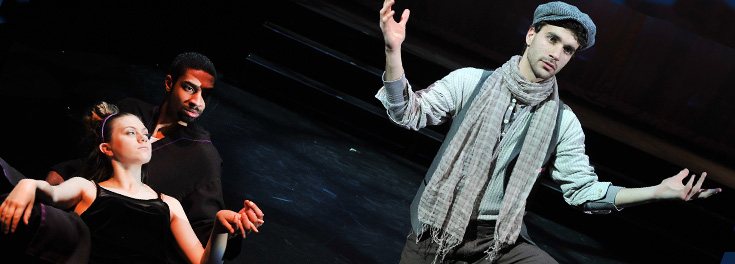URI Theatre weighs in on pandemic’s effect on industry
As many people, businesses and industries figure out what the “new normal” means for them during COVID, URI Theatre is doing the same. Photo from uri.edu.
Despite theatres being empty since March 2020, the University of Rhode Island theatre department continues to produce virtual shows while remaining hopeful for the return of live performances.
According to URI Theatre Director David T. Howard, theatre students have been working hard to gain new virtual skills, calling it a “silver lining” in the pandemic.
The theatre department has produced five radio plays since the beginning of the pandemic. In addition, he said they’ve produced a filmed production of “Miss Nelson is Missing” and are working on the Zoom play “The Importance of being Earnest in a Pandemic.”
Howard said that this has taught theatre students to be flexible and enabled them to learn new skills that will be beneficial to their careers.
“Offering students the opportunity to explore these things gives them the chance to then integrate them in ways that we don’t know,” said Howard.
Howard said that the theatre industry is constantly growing, changing and evolving, and teaching students new skills is preparing them for the future of theatre, whatever that may be.
“One thing that I think theatre majors can take out of this is [adaptability]. We’ve tried to embrace a variety of different ways of formulating theatre,” said Howard. “These students are much more resilient and have much more ability to create.”
Sophomore theatre major Kayla Ribiero said that it’s “frightening” being a theatre major in a time of uncertainty.
“It’s really difficult in general to get jobs as an actor, and the pandemic now has made that even worse,” Ribiero said. “However, in a way, it’s a blessing but a curse, because now we’re used to doing things online.”
Ribiero said that one of the benefits of everything being online is being able to audition for jobs across the country. She said that she’s been able to audition for roles all the way in California by sending in audition tapes.
She went on to say that the biggest challenge of the pandemic making everything online has been losing the connection with others that you can’t get via Zoom.
“It’s easier for everyone to get together online, because you just open your computer, and you’re at rehearsal,” Ribiero said. “However, through Zoom it’s harder to bond with the cast and crew because you can’t see each other face-to-face.”
Although the theatre industry in the United States, particularly Broadway, has been shut down since the beginning of the pandemic, Howard remains hopeful for the reopening of theatres across the country in the near future.
“The theatre industry has been around for thousands of years,” Howard said. “We’ve been through wars. We’ve been through pandemics. We’ve been through civil unrest. I think it will take a while, but it will definitely come back sooner or later.”
Howard predicts that when theatres open up again, there will be challenges with social distancing within the theatre and a loss of ticket sales. The loss of revenue will be more of a problem for bigger Broadway shows, such as “Hamilton” and “Wicked,” with larger casts and larger expenses. The less people that can go to the shows, the less money they make, which will force them to lower their budgets, hurting those productions most in the long run.
URI’s theatre department is preparing for next semester, hoping to be able to have in-person productions with audiences at limited capacity.
“Right now we’re picking our season for next year, and we’re managing to think about what is the lowest amount of people that we can have in a space, yet still support what we’re trying to do,” said Howard.
Ribiero said that she looks forward to the day that the theatre department can work fully face-to-face again, doing what they love and putting on live productions.

